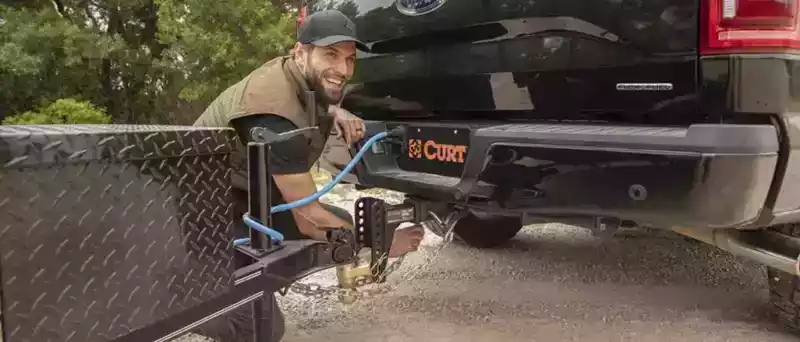Table of Contents
Introduction to Travel Trailer Hitches

Hitches are arguably the most important piece of equipment you have when towing a travel trailer. The travel trailer receiver hitch is the device that connects your vehicle to your trailer. It’s the crucial link that allows you to tow your travel trailer with your vehicle, be it a small car, an SUV, or a heavy-duty truck.
An RV hitch and towing setup is a set of components that allows you to safely attach your trailer to the back of your vehicle. This includes the hitch itself, as well as any other necessary equipment such as sway controls, wiring harnesses, etc. To ensure safe towing, it’s important to choose an RV hitch system that matches the size and weight of your travel trailer. It’s also important to make sure all components are installed correctly for optimal safety on the road.
Benefits of using a correctly configured hitch system include improved control when driving at higher speeds or in windy conditions; increased stability while turning or maneuvering; better fuel efficiency; greater safety when traveling long distances; and easier maintenance for both vehicles involved in the process.
The primary function of a hitch on a travel trailer is to facilitate the coupling between your towing vehicle and your trailer. It provides the means for these two separate entities to move together as a single unit. It is responsible for transferring some of the trailer’s weight to the vehicle. This effect ensures that the load is evenly distributed between the vehicle and the trailer, which in turn promotes stability and control while on the road. However, as we will learn, it is important to manage the amount of weight transfer to the tow vehicle.
The Importance of a Reliable Trailer Hitch
Having a reliable hitch is paramount for the safe and secure transportation of your travel trailer. It’s not just about moving the trailer from point A to point B; it’s about doing so safely and efficiently. A robust and reliable hitch can be the difference between a smooth journey and a disastrous one.
With a reliable hitch, you enjoy peace of mind knowing that your trailer is securely fastened to your vehicle, reducing the chances of accidents or damage to your trailer. It enhances the stability of your trailer on the road, particularly at high speeds and in challenging weather conditions. Investing in a high-quality hitch is non-negotiable. After all, the safety of your travel experiences and your fanily heavily relies on it.
Understanding the role and value of a travel trailer hitch is the first step towards making informed decisions about the type of hitch to choose, how to install and maintain it, and what accessories are essential for its functionality.
As we dive deeper into all the elements associated with receiver hitches used on travel trailers in subsequent sections, you’ll gain a broader perspective on why this seemingly simple device plays such a vital role in your travel journeys.
Types of Hitches Used on Travel Trailers
When it comes to connecting your vehicle to your travel trailer, you first need to have a receiver hitch installed on your tow vehicle if you don’t have one already. The receiver hitch is named for the actual receiver, which is what the square metal tube on the back of your vehicle is called. Receiver hitches are for the most part vehicle specific, because they have to attach directly to the frame of your tow vehicle securely.
For smaller vehicles and lighter trailers, a receiver hitch together with a simple ball mount and hitch ball inserted into the receiver to present a connection you for the trailer to connect is all you will need. Receiver hitches are for the most part vehicle specific, because they have to attach directly to the frame of your tow vehicle securely. For smaller vehicles and lighter trailers, a receiver hitch together with a simple ball mount and hitch ball inserted into the receiver to present a connection you for the trailer to connect is all you will need.
More common and highly recommended for any heavier trailer are weight distribution hitches. These setups derive their name from the function they provide of taking some of the weight sitting on the hitch ball and transferring it back to the wheels on the trailer. Achieving the correct weight balance across all of the suspensions and tires of your tow vehicle and trailer is essential for safe handling of the vehicle combination.
These setups derive their name from the function they provide of taking some of the weight sitting on the hitch ball and transferring it back to the wheels on the trailer. Achieving the correct weight balance across all of the suspensions and tires of your tow vehicle and trailer is essential for safe handling of the vehicle combination.
Having too much weight on the hitch ball may cause reduced contact on your front wheels, making for unsafe steering. Too little and the tail end of your trailer can be susceptible to violent swaying, which can be an even more serious safety issue.
Weight distribution hitches mitigate those potential problems. Some weight distributing hitches have built in sway controls or add-on sway controls can be added to them to further prevent trailer sway.
Adjustable hitches primarily refer to the shank, which is the part of the hitch that directly inserts into the receiver and also where the ball is mounted. Adjustable shanks offer the flexibility of adjusting the height and angle to ensure a level and secure connection between your vehicle and trailer.
This adaptability makes them a great choice if you tow different trailers or if your vehicle’s ride height changes due to varying load weights. Brands like Andersen Hitches and Gen-Y Hitches are well-known manufacturers of such adjustable hitches. B&W also makes high quality adjustable shank assemblies.
Weight Distribution Hitches
When it comes to towing a trailer, safety is of utmost importance. A weight distribution or weight distributing hitch is an essential tool that can greatly enhance the stability and control of your vehicle while towing.
A weight distribution hitch is a device that connects your trailer to your towing vehicle. It distributes the weight of the trailer more evenly across all axles, ensuring that the load is properly balanced. By doing so, it helps to reduce sway and improve stability when towing.
A weight distribution can greatly enhance the stability and control of your vehicle while towing.
For more detail on weight distribution hitches, read more in this article specifically about weight distribution hitches.
Brands of RV Receiver Hitches
Many companies manufacture these vehicle specific receiver hitches and weight distributing hitches. Some of the more common brans are:
U-Haul
When it comes to hitches, U-Haul versions are quite popular due to their high-quality construction and versatility. They offer a wide range of hitch options that cater to various towing needs, from lightweight trailers to heavy-duty ones.
One notable feature is their weld-on design, which offers enhanced stability and security. U-haul trailer hitches are also recognized for their long-lasting durability, ensuring that they can withstand the rigors of long-distance travel. They are sold exclusively at U Haul outlets.
B&W
Moving on to B&W trailer hitches, these are a top quality hitch renowned for their innovative designs and exceptional strength. B&W places a strong emphasis on safety and reliability, with hitches that fit securely and provide excellent control on the road.
Curt
Curt hitches are another excellent option, particularly known for their broad compatibility with various vehicles and trailers. With a reputation for solid craftsmanship, Curt hitches offer a balance of strength and ease of use. The company provides a variety of hitch types, including standard receiver hitches as well as 5th wheel and gooseneck hitches, catering to different towing requirements and preferences.
Selecting the Right Hitch for Your Travel Trailer
Choosing the right hitch for your travel trailer is a crucial step in ensuring safe and secure transportation. It’s not as simple as picking the most expensive or visually appealing model, there are several factors to keep in mind that will guide you to the perfect hitch for your specific needs.
Factoring in Weight and Towing Capacity
When it comes to towing, understanding the weight ratings is essential. These ratings are designed to ensure your vehicle can safely tow a trailer without damaging any components or putting passengers at risk. When determining the rating you need, consider both the trailer’s Gross Trailer Weight (GTW or GVWR) and tongue weight (TW).
The GVWR includes the weight of the fully loaded trailer—everything from the travel trailer itself to every last piece of gear you’ll be hauling. You’ll need a hitch that can handle this load without faltering, providing a sturdy connection between your vehicle and trailer. Weight Rating (GTW) and tongue weight (TW).
The GTW includes the weight of the fully loaded trailer—everything from the travel trailer itself to every last piece of gear you’ll be hauling. You’ll need a hitch that can handle this load without faltering, providing a sturdy connection between your vehicle and trailer..
Tongue Weight is how much weight is placed on the hitch itself when connected. To make sure you’re not overloading your vehicle and risking damage or safety issues, be sure that both these figures fall within your vehicle’s maximum capacity for safe operation.
Receiver hitches are classified into Class 1, 2, 3 and 4 for most travel trailer applications. Class 5 trailer hitches are used primarily for heavier duty and commercial applications for GTWs over 10-12 thousand pounds:
| Capacity – No Weight Distribution | Capacity With Weight Distribution | |||||
| Hitch Class | Applications | Receiver Size | Gross Trailer Wt. (lb.) | Tongue Weight (lb.) | Gross Trailer Wt. (lb.) | Tongue Weight (lb.) |
| Class 1 | Cars and crossovers | 1-1/4″ | Up to 2,000 | Up to 200 | — | — |
| Class 2 | Cars, crossovers and minivans | 1-1/4″ | Up to 3,500 | Up to 350 | — | — |
| Class 3 | Crossovers, vans, SUVs and trucks | 2″ | Up to 8,000 | Up to 800 | Up to 12,000 | Up to 1,200 |
| Class 4 | Trucks and SUVs | 2″ | Up to 10,000 | Up to 1,000 | Up to 12,000 | Up to 1,200 |
| Class 5 – Xtra Duty | Trucks and SUVs | 2″ | 16,000 to 17,000 | 2,400 to 2,550 | 17,000 | 2,400 to 2,550 |
| Class 5 – Commercial Duty | Dually and chassis cab trucks | 2-1/2″ | 18,000 to 20,000 | 2,700 | 18,000 to 20,000 | 2,700 |
Your vehicle’s towing capacity, on the other hand, is the maximum weight that your vehicle can safely tow. This information can typically be found in the owner’s manual. Choosing a trailer with a higher GVWR than your vehicle can handle can lead to damage or even accidents. The key is to keep the weight of your trailer and the tongue weight it will place on the rear of your tow vehicle less than your vehicle’s towing capacity. This ensures that neither your vehicle nor the hitch is overloaded, promoting safe travel.
Trailer Hitch Installation
The installation process for receiver hitches, while not overly complex, requires precision and attention to detail. It is a systematic procedure that, when done correctly, ensures your travel trailer’s safety during transit. Here, we’ll guide you through the typical installation process.
Overview of the Installation Process
Installing a hitch involves several steps. Before you start, be sure to read the instruction manual that came with your hitch. Tip: If you did not receive a manual, find one on the internet.
Tip: If you did not receive an Installation manual for your hitch, find one on the internet.
Most manufacturers have downloadable PDF files available for all of their manuals. Next gather all necessary tools and equipment, including your chosen hitch, bolts, and a torque wrench. The hitch would then be aligned with the mounting points on your vehicle, often found on the vehicle’s undercarriage.
Once properly aligned, the bolts are inserted into the pre-drilled holes and tightened using the torque wrench. It’s crucial to follow the manufacturer’s instructions regarding the torque settings to secure the hitch correctly. Finally, the electrical wiring, needed for brake lights and turn signals on the trailer, is connected following the instructions provided with your specific hitch model.
Though it might sound straightforward, the process can be tricky, especially for first-time installers. There are various aspects to consider, including the correct alignment of the hitch, ensuring secure bolt tightening, and proper electrical setup. Therefore, it’s essential to familiarize yourself with your vehicle and hitch specifications before embarking on the installation.
Professional Installation Services
If the thought of self-installation seems daunting, professional installation by a trailer hitch installer near you offers a viable alternative. These experts have extensive experience in installing different types of hitches, ensuring a secure fit and proper wiring connections. They also save you time and potential stress associated with a DIY approach.
Finding a professional hitch installation near you is easier than you might think. Many auto repair shops offer this service, as do specialized hitch installation companies. A quick online search should provide you with local options, along with reviews and ratings to help you make an informed decision.
In considering professional services, it’s worth noting that the cost will be higher than a DIY installation. However, the peace of mind knowing your hitch is installed correctly, ready for safe and secure travels, can certainly make the extra expense worthwhile.
Whether you choose to install your hitch yourself or opt for professional services, remember that proper installation is paramount to ensuring safety on the road. Take the time to understand the process, ask questions if needed, and ensure that your hitch is installed securely before hitting the open road with your travel trailer.
it is recommended to consult with experts or seek guidance from professionals in the field of towing equipment. They can help you determine the right weight distribution hitch for your needs and provide
Essential Accessories: Locks and Receivers
The journey to secure and efficient travel doesn’t end with selecting the right hitch for your trailer. Beyond the hitch itself, certain accessories play crucial roles in ensuring your trailer remains firmly attached to your vehicle. Two of these key accessories are hitch locks and receivers.
The journey to secure and efficient travel doesn’t end with selecting the right hitch for your trailer.
The Role of Hitch Locks
Think of a hitch lock as a security guard for your travel trailer. It prevents the accidental or intentional disconnection of your trailer from your towing vehicle. When properly used, a hitch lock can deter theft by making it significantly more difficult for someone to unhitch and abscond with your trailer. In essence, it provides an added layer of security that gives you peace of mind during your travels.
Types of Locks
Hitch locks come in various shapes and sizes, each designed to cater to different types of hitches and trailers. Some common types include pin-style locks, barbell locks, and coupler latch locks. Pin-style locks are simple yet robust, often used in receiver-style hitches. Barbell locks bear a resemblance to their namesake and secure the coupling point between the hitch ball and the trailer coupler. Coupler latch locks secure the coupler’s latch that hooks over the hitch ball.
Choosing the Right Locks and Receivers
When selecting a hitch lock, consider the type of hitch you have, the value of your trailer, and where you’ll be leaving your trailer unattended. A high-quality, robust lock might be a wise investment if your trailer is particularly valuable or if you frequently park in areas where trailer theft is common.
Choosing the right receiver depends on your hitch size and towing capacity. It’s essential to ensure that your receiver can handle the weight of your trailer and fits your hitch perfectly. An ill-fitting receiver can lead to trailer sway, detachment, or even accidents.
In both cases, quality should not be compromised. Opt for well-known brands that have positive customer reviews and offer good warranties. Remember, these accessories are not just about convenience; they’re about the safety of your travel experience.
Maintenance and Safety Precautions for Receiver Hitches
Just like any other integral part of your travel trailer, the hitch also requires regular attention and care. Routine maintenance practices for hitches are not only crucial to ensure longevity but also paramount for safety. These practices range from simple visual inspections to more detailed checks.
Routine Maintenance Practices
The first step in maintaining your hitch is regular cleaning. Dirt, grime, and rust can affect the performance of your hitch. Hence, it’s recommended to clean your hitch with a wire brush and apply a corrosion-resistant spray on all its metal parts. Secondly, always ensure that the hitch components are properly lubricated. This reduces friction and prevents wear and tear, especially when dealing with heavy loads.
Another critical maintenance practice is checking the torque of the hitch bolts regularly. These should be tightened according to the manufacturer’s specifications to prevent any movement while towing. Lastly, remember to inspect the hitch regularly for any signs of damage or wear. If you notice any cracks, bends, or excessive rusting, it might be time to replace your hitch.
Safety Precautions
In addition to regular maintenance, there are several safety precautions you should keep in mind when using a hitch. The first and most important rule is never to exceed the specified weight limit of your hitch. Overloading can lead to catastrophic failure of the hitch system, endangering you, your passengers, and others on the road.
Before setting off on a journey, make sure to check that the hitch is correctly attached to your vehicle and that the trailer is securely connected to the hitch. This includes checking the safety chains, ensuring they are crossed under the hitch to catch the trailer tongue if it disconnects.
Another key safety precaution is to evenly distribute the weight in your trailer. An improperly balanced load can cause the trailer to sway or jackknife, leading to dangerous situations on the road. Also, remember to adjust your driving habits when towing a trailer. This means taking turns more slowly, allowing for more stopping distance, and avoiding sudden maneuvers.
To conclude, regular maintenance and adherence to safety precautions can significantly enhance the life span and performance of your hitch. Remember, when it comes to hitches, an ounce of prevention is indeed worth a pound of cure.
Tire Pressure
It’s also important to check tire pressure before each trip with a full load of cargo in tow. The extra weight from a trailer causes tires to lose air pressure faster than usual, so checking them regularly will help keep you safe and reduce wear and tear on the tires themselves. In general terms, tire inflation should be equal between each side of an axle; however, some trailers may require slightly higher inflation along one side if they have uneven loading across their axles due to differences in cargo distribution..
FAQs
What are the best RV best trailer hitches on the market?
The highest quality adjustable hitches are made by B&W, and Equal-I-Zer makes a premium weight distribution hitch. Curt and Husky are good cost effective choices. If you’re looking for a hitch that effectively hides the receiver when you are not using it, the Ecohitch from Torklift is a good choice. Torklift also makes the Superhitch, designed for extremely heavy trailers.
What are the two types of RV trailer hitches?
A standard receiver hitch with ball mount and shank are suitable for light trailer applications. Larger and heavier trailer applications need a weight distribution hitch.
What size trailer hitch should I get?
Your hitch should be of a sufficient capacity to handle both the total weight of your loaded trailer, as well as the tongue weight on you hitch ball. Generally a rule of thumb for hitches is that the tongue weight capacity will be about 10% of the total trailer weight capacity.
How hard is adding a hitch for a bike rack to a trailer?
If you have a bumper there are adapters available that will clamp on a bumper and provide a 2″ receiver for you to mount your bike rack. There are also universal RV hitches that can be installed on the frame if you do not have a bumper.
Can you put a hitch on the back of a travel trailer?
There are width-adjustable hitches that can be installed on the rear frame of most trailers.
Can hitches be rented?
You may be able to find a company who will rent you a weight distribution hitch. Because receiver hitches have to be permanently installed on your tow vehicle, it’s not practical to rent them.
Summary
We’ve taken a fascinating journey through the world of hitches? We’ve dissected what a hitch is, how to select and get one installed, and discussed some additional accessories you can add. We’ve also emphasized the hitch’s fundamental function in ensuring safe and secure transportation of your travel trailer. It’s not just about connecting your vehicle to your travel trailer – it’s about ensuring you and your loved ones are safe on the road.
Safe RV travels begin with the right equipment, and investing time now in finding and maintaining the perfect hitch will pay dividends in the future. It’s your journey, make sure it’s a safe one!









